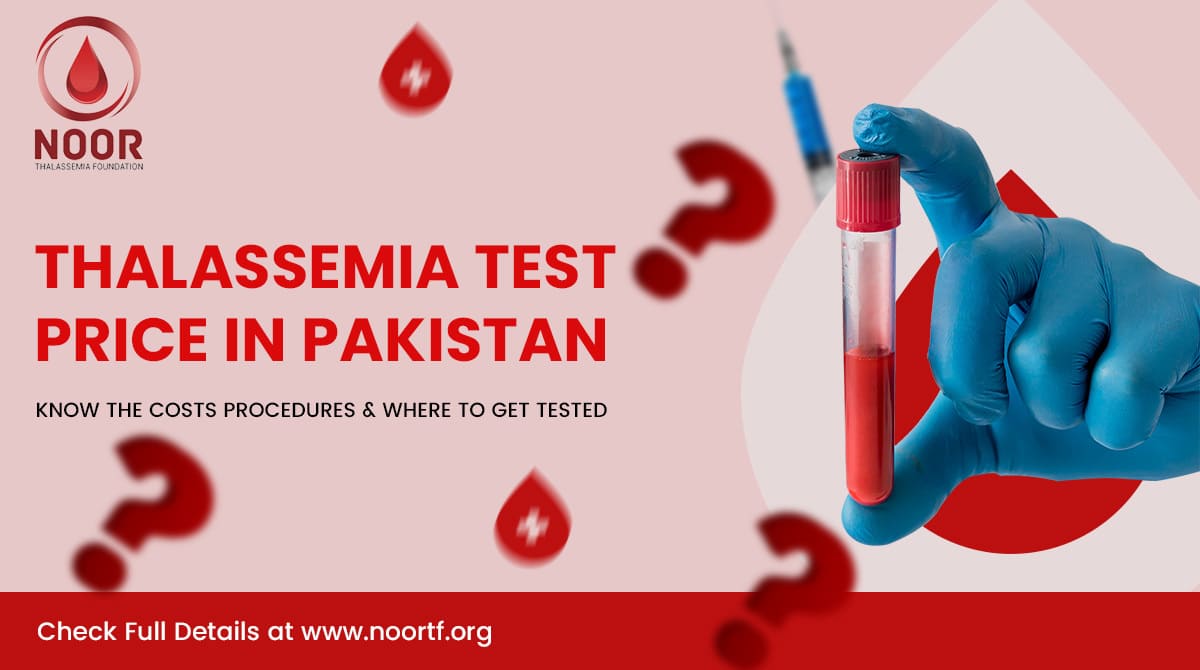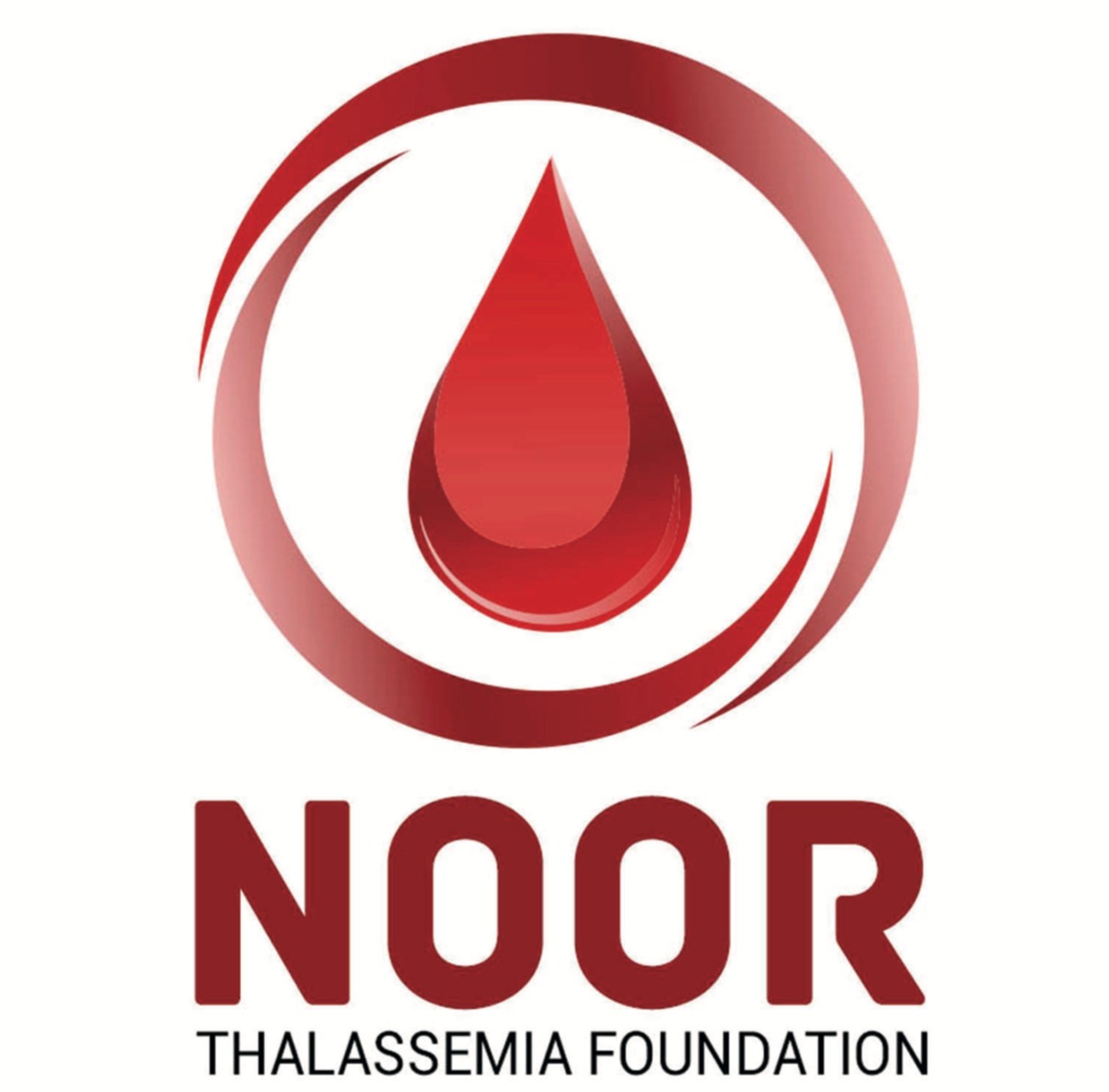Thalassemia Test Price in Pakistan
24-Jul-2025

Discover the cost of thalassemia tests in Pakistan and learn how early detection, genetic counseling, and support from Noor Thalassemia Foundation can prevent its spread.
Effective management of thalassemia, a dangerous hereditary blood condition, depends on early detection. Given that thalassemia affects millions of people worldwide, including a sizable portion in Pakistan, it is critical to comprehend the expense of thalassemia testing and treatment to guarantee that everyone has access to quality medical care. The cost of testing in Pakistan, the types of tests available, and the general impact of the condition on individuals and families are just a few of the topics that will be covered in this article.
What is Thalassemia and Its Impact in Pakistan?
The insufficient production of hemoglobin by the body is the hallmark of thalassemia, a genetic blood disorder. Reduced oxygen flow throughout the body due to inadequate hemoglobin causes exhaustion, pallor, and in extreme situations, organ failure. Alpha and beta thalassemia are the two primary forms of thalassemia. In Pakistan, thalassemia is very common, and many people are not aware that they are carriers. Because of this, early detection—by using a straightforward thalassemia test—is crucial to preventing the disease from being passed on to future generations.
Thalassemia Federation of Pakistan
The Thalassemia Federation of Pakistan plays a pivotal role in uniting NGOs, government bodies, and healthcare workers to combat this condition. It promotes screening programs, public awareness campaigns, and blood donation drives to support patients with thalassemia.
They also collaborate with centers like Noor Thalassemia Foundation, making testing and treatment more accessible and cost-effective.
Thalassemia Test Price in Pakistan
The type of test and the medical facility where it is performed are two examples of the variables that can affect the cost of a thalassemia test in Pakistan. While more sophisticated tests, such as genetic screening, can cost anywhere from PKR 8,000 to PKR 15,000 or more, a basic thalassemia screening test typically costs between PKR 1,500 and PKR 5,000.
The Noor Thalassemia Foundation (NoorTF) provides free thalassemia testing and treatment, as well as support for other blood disorders, including cancer and hemophilia, to individuals from low-income backgrounds. To provide this vital service to the impoverished population, the foundation relies on donations, ensuring that people's inability to pay for healthcare does not prevent them from accessing it.
Alpha Thalassemia Test Cost
Compared to beta thalassemia screening, the alpha thalassemia test is usually more costly and more specific. Depending on whether a DNA-based test or a more straightforward blood test is performed, the price in Pakistan can vary from PKR 2,500 to PKR 5,000.
Nonetheless, many free health camps and foundations offer this test to impoverished families at no cost.
Thalassemia Minor and Marriage
People with thalassemia minor, a condition in which they carry only one faulty thalassemia gene, typically do not show severe symptoms. On the other hand, children of a thalassemia minor carrier may inherit the defective gene. Marriage between two people with thalassemia minor increases the likelihood that their child will inherit two faulty genes, which could result in thalassemia major, a potentially fatal form of the condition.
This raises a crucial question: Is it possible for two children with thalassemia to marry? Yes, but it is strongly advised that they get genetic counselling before getting married. The potential risk of having a child with thalassemia major can be evaluated with the aid of genetic counselling. Couples can make informed decisions about family planning if they receive accurate information and guidance.
Alpha Thalassemia and Its Silent Carrier Status
A form of thalassemia known as alpha thalassemia is brought on by a shortage of alpha-globin chains in hemoglobin. Alpha thalassemia gene carriers are often referred to as "silent carriers" because they frequently exhibit no symptoms. Genetic testing is crucial for family planning because even if they don't show symptoms of the disorder, they can still pass the gene on to their offspring.
If both parents carry the gene, pregnant women with alpha thalassemia may experience complications. Alpha thalassemia major is more likely to be inherited by the child in these situations. To evaluate the risks and take preventative action, pregnant women who are carriers must receive genetic counselling and screening.
Sickle Beta Thalassemia and Delta Beta Thalassemia
A person with sickle cell trait from one parent and beta thalassemia trait from the other is said to have sickle cell disease and beta thalassemia trait. A more severe condition than either sickle cell anemia or thalassemia alone may arise from this combination. Anemia, pain episodes, and an elevated risk of infection are all signs of sickle cell beta thalassemia.
In contrast, mutations in the beta-globin and delta-globin genes cause delta beta thalassemia, a rare type of thalassemia. Despite being less prevalent, the condition still needs medical attention and can lead to serious health problems. Frequent blood transfusions and other therapies may be necessary for people with sickle beta thalassemia or delta beta thalassemia to manage their symptoms.
Thalassemia Treatment in Homoeopathy
Some people look for alternative therapies like homoeopathy, even though conventional medical treatments like iron chelation therapy and blood transfusions are crucial for managing thalassemia. The focus of homoeopathy is on the body's innate capacity for self-healing, which is triggered by highly diluted substances.
Despite the lack of scientific proof, some patients opt for homoeopathy as a supplemental treatment for thalassemia. Before beginning homoeopathic remedies, it is crucial to speak with a healthcare professional, particularly for those with severe forms of thalassemia.
World Thalassemia Day
A vital occasion dedicated to raising awareness of thalassemia and the importance of early diagnosis and treatment is World Thalassemia Day, observed annually on May 8. The day draws attention to the difficulties that people with thalassemia face and calls on communities, governments, and medical organizations to make investments in improved healthcare.
To educate the public about the disease and the importance of early detection, the Noor Thalassemia Foundation in Pakistan organizes events and educational programs in conjunction with World Thalassemia Day celebrations.
Difference Between Thalassemia and Sickle Cell Anemia
Although both sickle cell anemia and thalassemia are inherited blood disorders, their symptoms and genetic causes are different. Anemia and exhaustion are symptoms of thalassemia, which is caused by abnormalities in the genes that produce hemoglobin. Conversely, sickle cell anemia results from mutations in the hemoglobin gene that produce sickle cells, which are atypically shaped red blood cells that can obstruct blood flow and cause excruciating pain.
Although anemia is a symptom of both conditions, the signs and treatments vary. While thalassemia usually necessitates frequent blood transfusions to maintain normal hemoglobin levels, sickle cell anemia frequently causes excruciating pain episodes.
Frequently Asked Questions
1. What is the name of the thalassemia test?
The thalassemia test is commonly referred to as a "thalassemia screening test" or "thalassemia diagnostic test." It helps identify individuals who are carriers of the thalassemia gene.
2. What are the hemoglobin levels in thalassemia minor?
Individuals with thalassemia minor typically have mild anemia, and their hemoglobin levels usually range from 9 to 11 g/dL. This may vary depending on the severity of the condition.
3. Can a thalassemia test be done during pregnancy?
Yes, thalassemia testing can be done during pregnancy. Genetic testing during pregnancy can help determine if the baby is at risk for thalassemia major.
4. What is a thalassemia screening test?
A thalassemia screening test is a blood test that detects abnormalities in hemoglobin. It is used to identify carriers of thalassemia and to assess the risk of passing the condition to future generations.
5. What is the normal range for a thalassemia test report?
The normal range for a thalassemia test report will depend on the specific test conducted. For a basic thalassemia screening, normal hemoglobin levels usually fall between 12-16 g/dL for women and 13-17 g/dL for men.
 +042 111 666 783
+042 111 666 783